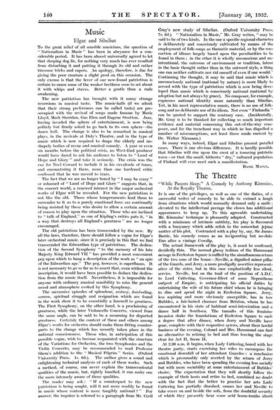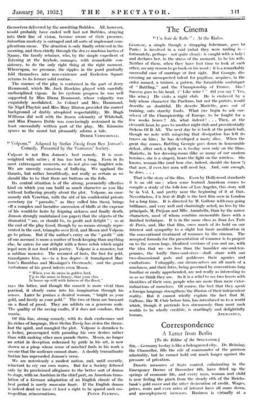The Theatre
"While Parents Sleep." A Comedy by Anthony Kimmins. At the Royalty Theatre.
IT is one of the privileges, as well as one of the duties, of a successful writer of comedy to be able to extract a laugh from situations which would normally demand only a smile ; elevated to the intellectual peerage the clown has additional appearances to keep up. To this agreeable undertaking Mr. Kimmins' technique is pleasantly adapted. Constructed with a minimum of intrinsic subtlety, his play is flavoured with a buoyancy which adds relish to the somewhat jejune matter of his plot. Contrasted with a play by, say, Sir James Barrie, his comedy comes as an invigorating but no-date Eno after a vintage Cowslip.
The actual framework of the play is, it must be confessed, decidedly thin. The normal glassy tedium of the Hammond menage in Eceleston Square is ruffled by the simultaneous return of the two sons of the house—Neville, a dignified minor pillar of the Guards, and Jerry, a more prodigally assertive represent- ative of the sister, but in this case emphatically less silent, service. Neville, hot on the trail of the position of A.D.C. to Lord Cattering, Governor-Elect of some Nepenthean outpost of Empire, is anticipating his official duties by entertaining the wife of his future chief whom he is bringing to dine and spend the night in Eecleston Square. Jerry, less aspiring and more obviously susceptible, has in tow Bubbles, a fair-haired charmer from Brixton, whom he has encountered in his state of habitual semi-intoxication and a dance hall in Southsea. The tumults of this feminine invasion shake the foundations of Eccleston Square to such a degree that after dinner, when Jerry and -Neville have gone, complete with their respective syrens; about their lawful business of the evening, Colonel and Mrs. Hammond can find no alternative to retiring to bed and thus leaving the stage
clear for Act II, Scene IL -
At 2.30 a.m. it begins, when Lady Catering, bored with her theatre party, starts exercising her wiles to encompass the emotional downfall of her attendant Guardee E a Conclusion which is presumably only averted by the return of Jerry and Bubbles, who have been spending the evening less socially but with more sociability at some entertainment of Bubbles' choice: The expectation that they will shortly follow the example of -their hosts and retire to bed, combined no doubt with the fact that the better to practise her arts 'Lady Cattering has partially disrobed, causes her and Neville to take -cover on and beside the sofa, 'from the doubtful security of which they presently hear sonic acid- hoote-trUths aboitt themselves delivered by the unwitting Bubbles. All, however, would probably have ended well had not Bubbles, straying into their line of vision, become aware of their presence. Suburban modesty is outraged and all sorts of unpleasant com- plications, ensue. The situation is only finally retrieved in the morning, and then chiefly through the des ex mochina tactics of Nanny, the family retainer, who, by the simple expedient of !Wiling at the keyhole, manages, with remarkable LIM. uistency, to do the only right thing at the right moment. Whereupon, we presume, the ripples in the pond gradually fold themselves into non-existence and Eceleston Square returns to its former solid routine.
The essence of the play is contained in the part of Jerry Hammond, which Mr. Jack Hawkins played with carefully undisciplined vigour. In his cyclonic progress he was well . supported by Miss Diana Beaumont, whose vulgarity was exquisitely modulated. As Colonel and Mrs. Hammond, Sir Nigel Playfair and Miss Mary Hinton provided the correct background of drably atrophied respectability. Mr. Hugh Williams did well with the frozen solemnity of Whitehall, and Miss Frances Doble was convincingly restrained in the least successfully written part of the play. Mr. Kimmins spares us the moral but pleasantly adorns a tale.
DEREK VERSCHOYLE.





































 Previous page
Previous page